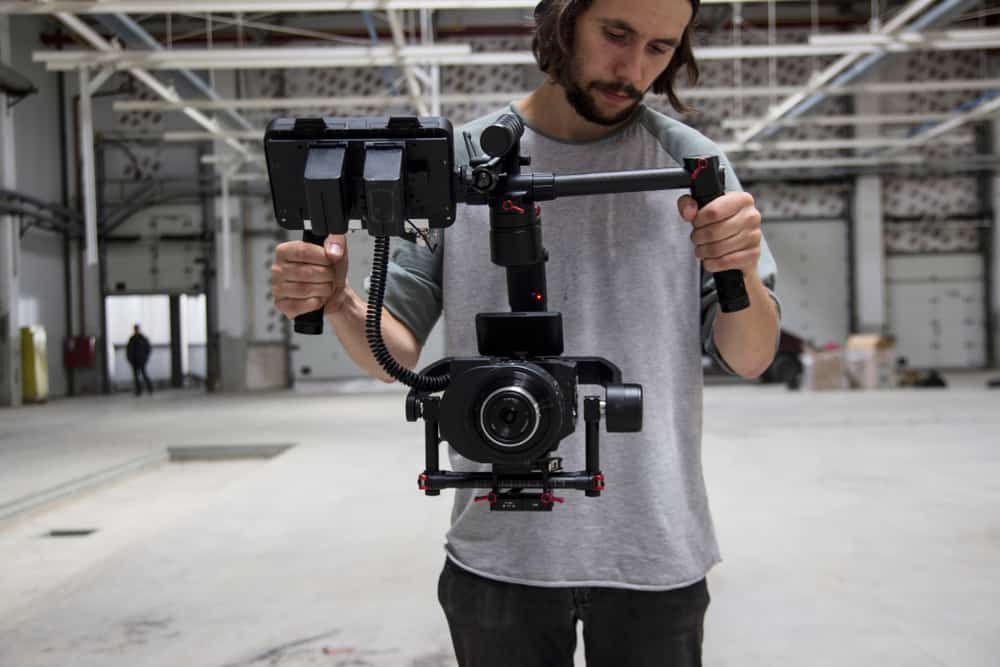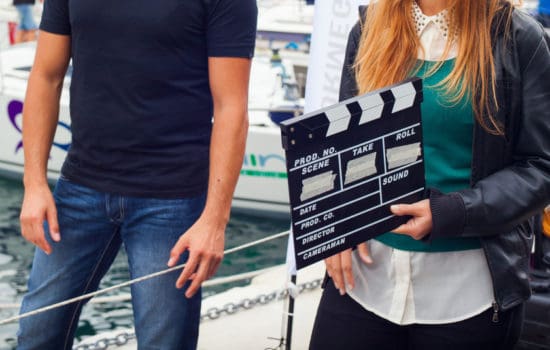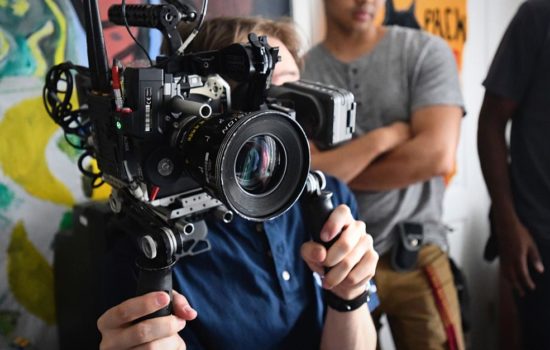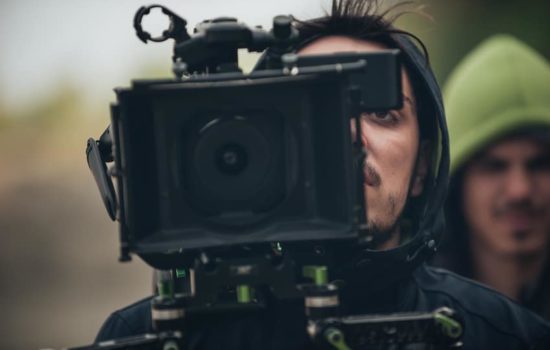If you’re wondering how to become a cameraman (i.e. camera operator), this page will explain it all.
The cameraman works with the cinematographer and director to make the vision of a movie or show come to life.
The cameraman is the physical shooter of a film or TV show, responsible for using a camera and its corresponding equipment to record and capture all aspects of a scene.
The proper name for a cameraman (or camerawoman, as the case may be) is camera operator.
On lower-budget films, the line between a cameraman and a cinematographer can blur, with one person wearing two hats.
From a professional standpoint, a cinematographer is more of an artist who collaborates with the director to create a mood and aesthetic for the film that best suits the director’s overall creative vision.
The camera operator, on the other hand, technically executes the camera, lighting, lens, filters, and other equipment to achieve the look and feel the director and cinematographer have worked out for the film.
A cameraman (or camera operator) is responsible for physically operating the camera during film, television, or video production.
Their main job is to capture the visual elements of a story according to the director and cinematographer’s vision.
In larger productions, there can be multiple camera operators. For example, there might be Steadicam operators or drone camera operators. In smaller shoots, the camera operator might also handle lighting and sound.
Here’s a breakdown of what they typically do:
- Set up and operate cameras — including choosing lenses, adjusting focus, framing shots, and sometimes moving the camera during takes (e.g., panning, tracking, tilting).
- Work with the director and director of photography (DP) — to translate the visual style and mood into actual shots.
- Frame shots creatively — deciding on composition, angles, and camera movements to make scenes visually compelling and support storytelling.
- Adjust technical settings — like exposure, white balance, and focus, sometimes on the fly.
- Manage camera equipment — setting up rigs, dollies, tripods, gimbals, cranes, or handheld gear.
- Collaborate — work closely with lighting technicians, grips, and sound crews to ensure everything works together for the shot.
- Problem-solve quickly — finding workarounds for technical issues or adapting to unexpected changes on set.
Here are the main skills and equipment you would be using as a camera operator…
The most essential component of the cameraman’s job is (obviously) the camera. There’s no movie without it.
A cameraman needs to fully understand all aspects of the motion picture camera, its components, its functions, its lenses, and its limitations to properly master the craft.
The knowledge needs to exist not only on a textbook level but also through genuine and extensive experience with the equipment to truly understand its functions and capabilities.
The lens focuses light to provide a clear image for the cameraman.
The lens is crucial not only for forging the desired image but also in crafting an audience’s understanding and reaction to a shot or scene.
A telephoto lens, for instance, is made for zooms to grab images with deep detail. Conversely, a wide-angle lens provides more to see, covering an expansive area of the locale.
Filters go hand-in-hand with camera lenses. Filters are devices used on lenses that modify the component wavelengths of mixed light before it reaches the film.
In short, they affect the resolution of the image by altering how much the naked eye will see. Filters can be gelatin, plastic, or colored glass.
Lighting is key to creating just the right image. Lighting can determine mood, build atmosphere, and even help clarify narrative.
A lot of time is spent lighting sets because it’s such a crucial aspect of the filmmaking process. Lighting determines not only how much of a scene is visible to an audience, but also how the audience should perceive a scene.
While it’s not necessarily a camera operator’s charge to determine how a shot should be framed and how an angle should be composed, it is their responsibility to execute the exact composition as requested by the director (or cinematographer).
Ideally, there should be an exactness to shot-framing, as audiences will react to what they do (and don’t) see in a movie. This requires artistic skill to create something that both conveys information to an audience and is visually engaging.
Focusing involves calibrating the lens to find an image’s level of maximum sharpness and detail.
There are two types of methods for camera focus — automatic and manual.
Automatic relies on a motor in the camera (or lens) to bring a subject into focus. Manual is when the lens is brought into focus by hand.
Sometimes a focus puller, a member of the camera department, is charged with adjusting the focus of a shot in progress (while the camera operator handles the actual camerawork).
This means keeping a subject in focus for the duration of a shot or racking the focus as either the subject or the camera moves through the scene.
Whether it be on a dolly, track, crane, or other movable contraption, a camera operator needs to move the camera appropriately to properly capture the scene.
Cameras can also pan (move side to side) and tilt (move up and down) as necessary, so the operator must be accustomed to and practiced at these motions and have a thorough understanding of how to execute them during production.
Camera movements can be key factors in determining both the emotional resonance and narrative clarity of a scene.
And let’s face it, visually, a moving camera tends to give a scene more vibrancy than those comprised solely of static moments.
It can take years to become a successful camera operator, but the path to get there is relatively simple.
- Earn a degree
- Intern on sets
- Network, Network, Network
- Apply for positions
Let’s explore these components so that we can understand them in a practical sense…
Do you absolutely need a degree to operate a camera? No.
However, a film degree does serve as extremely valuable in learning the technical ins and outs of a camera, lenses, lighting, and filters.
On top of that, having a degree in the field reflects a lot better during a job interview than not having one.
Ultimately, on-set experience can be just as or more valuable to a potential client.
Whether through school, independent studies, personal projects, and/or working on set, developing certain skills can make it much easier to become a cameraperson.
These include:
- Technical knowledge of cameras and their corresponding equipment (lenses, lighting, filters, cranes, etc.)
- Proven experience operating a camera and said corresponding equipment
- An ability to understand and work within the parameters of a shooting script
- The wherewithal to think and act on your feet (sets can get unpredictable)
- Great communication skills
- A can-do attitude and the ability to work with and among many different personalities
- The ability to work under pressure
While the pay of an internship typically isn’t great and often nonexistent, the experience it offers is priceless.
Interning for a camera department brings you right into the heart of the filmmaking process, where you can really observe and learn the method, process, and how to act and behave on a film set.
The latter happens to be just as important as the former, as people tend to work repeatedly with crew they like (and not with folks they don’t). Learning to navigate personalities on a high-pressure film set is an art and a learned skill unto itself.
This is the entertainment industry, and finding a gig in this niche of the field is just as reliant on networking as any other. It’s all about being friendly and open with people.
Demonstrate you’re someone who not only understands the craft and technicalities of the camera, but also that you’re easy to work with.
Film sets often run long hours. You want to make sure you’re surrounded by people you get along with, or those hours are going to feel a lot longer.
After you’ve got enough experience under your belt and have sufficiently networked, you’re ready to start offering up your camera operating services in a professional capacity.
This means looking for jobs everywhere, especially at the beginning. The pay will often be low when you’re starting out, but more important than the income is gaining experience.
The more film sets you work on, the better you’ll understand the job — from technical, craftsmanship, and business angles. Your chances at more work increase exponentially from this.
The average salary for a camera operator (FKA cameraman) in the United States is $21.31 per hour. It can range from $5.29 to $60.821.
The pay of a camera operator can vary widely. It may be low or nothing at first, but it can grow as you gain more experience and improve your skills.



